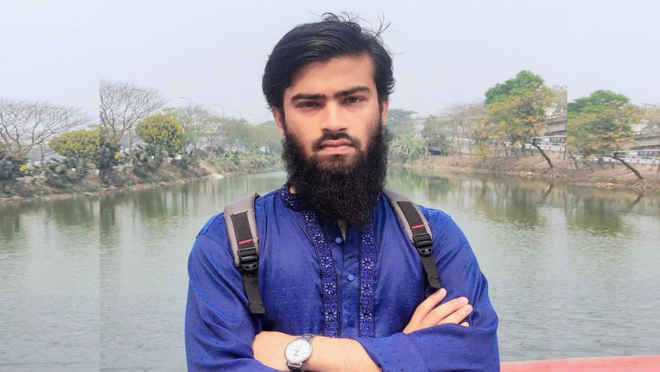July remembrance: BUTEX survivor builds website to honour martyrs
July remembrance: BUTEX survivor builds website to honour martyrs

As July 2025 marks the first anniversary of Bangladesh’s historic student uprising, the memories of those dark days still burn fresh in the hearts of survivors. Among them is Mofakhkharul Islam Niyaz, a student who carries both physical scars and an unshakeable resolve to ensure the nation never forgets its martyrs.
For Niyaz, a 48th batch student of Fabric Engineering at Bangladesh University of Textiles (BUTEX), July 2024 was a month that changed everything. What began as protests against quota reform transformed into a nationwide movement against injustice — a movement that would cost hundreds of lives and forever alter the course of Bangladesh’s history.
“Why did you kill my brothers?”
19 July, Friday.
After Jumma prayers, Niyaz stepped onto streets stained with blood. Armed men in civilian clothes blocked the way, but fear had been replaced by righteous anger.
“We cannot be afraid!” he shouted, then looked his oppressors in the eye: “Why did you kill my brothers yesterday? What was their crime?”
The gunshot that followed sent him to the ground, warm blood pooling beneath his feet. Strangers rushed to help, tearing their own clothes to bandage his wounds, carrying him to safety in a rickshaw.
Hospital of horrors
Advanced Hospital in Banasree became a scene from hell. Blood-soaked floors, the cries of the wounded, and the silence of the dead. Eleven people were martyred in that hospital alone —children, teenagers, young people whose only crime was demanding justice.
When forces attacked the hospital that afternoon, patients, doctors, and nurses fled to upper floors. Niyaz survived with his life, but the images would haunt him forever.
5 August: A new dawn
Weeks later, on 5 August, Niyaz limped through the streets of a transformed Dhaka. People celebrated freedom, but he knew the cost — paid in blood by those who would never see this day.
His vow, made that day, remains unbreakable: “This nation must never forget their sacrifice.”
Building a digital monument
From his hospital bed, Niyaz conceived a mission: to preserve the memory of every martyr, every wounded warrior, every disappeared soul. Working with his friend Shahriar, he created www.genocide2024.info in just two weeks.
“Initially, there was no plan to create a website,” Niyaz explains. “But I feared the true number of martyrs might be lost to time. This history must be preserved.”
The website now holds over 274 verified profiles of martyrs, complete with their stories, dreams, and the circumstances of their deaths. Each entry represents a life cut short, a family shattered, a future stolen.
July remembrance: A sacred duty
As the first anniversary approaches, Niyaz’s mission expands beyond documentation. He envisions a comprehensive memorial book, government recognition, and most importantly, a culture of remembrance that will outlast any single generation.
“This is not just about the past,” he emphasises. “July 2024 must become our eternal reminder of what happens when a nation stands up for justice. Every July should be a month of remembrance.”
A call to remember
To those who lived through July 2024, Niyaz offers an invitation: “Join us in this sacred duty. Share your stories, preserve the memories, teach the next generation.”
“The martyrs gave their lives so we could live in freedom. Our responsibility is to ensure their sacrifice was not in vain.”
As Bangladesh prepares to mark the first July Remembrance, Niyaz’s message resonates: the scent of gunpowder may fade, but the memory of those who fell must burn eternal.


